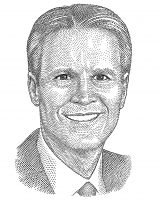
David B. Hellmann,
M.D., M.A.C.P.
You may be wondering why we have musical notes on our cover, and what Beethoven’s 9th Symphony could possibly have to do with the Center for Innovative Medicine. Quite a lot; the music itself is a song of triumph, and it has become our anthem here at the CIM. I hope that when you read the story (see Page 4), you will be inspired, as well. Despite circumstances that would have been enough to discourage anybody – family stress, financial woes, chronic illness, disability, and pain – Beethoven found joy. He overcame.
You may wonder, too, when I tell you that a recent speaker here at the CIM was Robert S. Ford, who served as the U.S. Ambassador to Syria from 2010 to 2014. He didn’t talk about anything remotely medical. But what he did talk about – making change happen under enormous constraints, being a leader through difficult, seemingly unnavigable terrain, being there for your people, never forgetting what your job is – resonated with all of us who heard him. The obstacles he faced, much like Beethoven’s, could have defeated him; instead, he overcame them and found greater good. Here at the CIM, we’re not in a war zone, of course; but things go wrong, we face many challenges, and although many of our patients get better, not all of them do. But every day, we do our best to overcome, to change the terrain for the better. We draw inspiration from many fields, from literature, business, the arts, and even diplomacy. We hope always to be learning and improving, and we will gladly listen to anyone who has the potential to teach us something new.
This time of the year, many of our headlines around here involve the Miller and Coulson families. We just celebrated our 7th Annual Excellence in Patient Care Symposium at the Miller-Coulson Academy, and each year we have more to celebrate (see Page 14). Our 12th Annual Miller Lecture was delivered by Tom Duffy, a world-class clinician who shares some beautiful thoughts with us (see Page 17) about service, and where true fulfillment lies in medicine.
Also in this issue: Some good science, recently published by Rakhi Naik in JAMA, and new insights into sickle cell trait, which may make a huge difference for African Americans at risk of chronic kidney disease (see Page 12). We discuss another JAMA article, too; this one was written by our Miller Professor, Roy Ziegelstein, Vice Dean for Education at the Johns Hopkins School of Medicine, on what he calls “Personomics.” This is a core belief of the CIM’s Aliki Initiative: Know the person who is the patient. Knowing the real-life variables, such as a patient’s ability to pay for a prescription, is just as important as understanding the patient’s molecular biology or lab values. You’ll also hear from one of our Aliki graduates, Sujay Pathak, now practicing medicine in Baltimore. The Aliki approach has made a huge difference to his patients, but it has also made a difference for him personally. “I find myself incredibly happy in my medical practice,” he says. Wonderful words – words we’d like to hear more often.
And this brings us back to joy.

Aliki Perroti Professor of Medicine;
Vice Dean, Johns Hopkins Bayview Medical Center;
Chairman, Department of Medicine